|


By Jamie L. Freedman
And the responses resounded. Perhaps never in history has a rhetorical question produced such practical results—or touched the lives and hearts of so many people.
Some want to change the world. Others want to bolster their resumes. Many simply crave the opportunity to experience life from a totally different perspective. Since the Peace Corps’ establishment 40 years ago by President John F. Kennedy, more than 163,000 Americans have risen to the challenge, “Ask what you can do for your country,” serving as volunteers in 135 countries throughout the developing world.
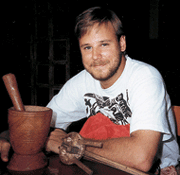 |
|
Dave O’Neill, BA ’88, MA ’97, enjoys soaking up some local color in Sierra Leone, where he served as a Peace Corps volunteer from 1989 to 1991.
|
The George Washington University has played an active role in the Peace Corps’ success, ranking 22nd nationally this year on the agency’s annual list of volunteer-producing universities, with 36 graduates currently serving overseas. GW alumni are making a difference in far-flung nations throughout the developing world—from Africa to Latin America and, most recently, in countries like Russia and Uzbekistan. Their assignments are wide-ranging—running the gamut from helping to stop the spread of AIDS to teaching English and management skills in former socialist countries.
GW alumni join the Peace Corps for myriad reasons. “A lot of us are motivated to seek adventure, to help people, and to get a different view of the world,” says Dave O’Neill, BA ’88, MA ’97, president of the D.C. chapter of Returned Peace Corps Volunteers.
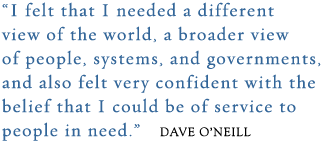 “When I decided to join the Peace Corps in 1989, I had been working full time on Capitol Hill for three years and saw things from a very pluralistic, American lens,” says O’Neill. “I felt that I needed a different view of the world, a broader view of people, systems, and governments, and also felt very confident with the belief that I could be of service to people in need. Since I had no strings tying me down, I thought it was the perfect time to join the Peace Corps. I was willing to go anywhere and do anything.” “When I decided to join the Peace Corps in 1989, I had been working full time on Capitol Hill for three years and saw things from a very pluralistic, American lens,” says O’Neill. “I felt that I needed a different view of the world, a broader view of people, systems, and governments, and also felt very confident with the belief that I could be of service to people in need. Since I had no strings tying me down, I thought it was the perfect time to join the Peace Corps. I was willing to go anywhere and do anything.”
O’Neill was assigned to Sierra Leone, a small, impoverished West African nation, where he worked as a rural water supply/health education adviser. “For six months, I traveled by motorcycle to 55 villages over a 135-mile radius, supporting the construction of water wells,” says O’Neill. “It was wonderful.” During his second year, O’Neill renovated a primary school, building latrines and converting an oversized classroom into a community hall with a stage. “In the school’s 25-year history, kids had never before had a place to go to the bathroom or wash their hands,” recalls O’Neill, “and the community hall gave the school a space to rent out to collect revenue for teaching supplies. It was incredibly rewarding. I wound up extending my time there so that I could finish up the project.”
O’Neill, who now works at the Peace Corps’ Washington, D.C., headquarters as a process manager in the medical office, says that the enthusiasm of today’s applicants is the same as when he joined more than a decade ago. “The motivation of many incoming volunteers is somewhat different, however, since the global economy offers so many exciting options for returning Peace Corps volunteers,” he comments.
|
|
|
Hand washing the time-honored way, in Turkmenistan
|
These days, Peace Corps assignments provide many volunteers with an ideal opportunity to test the waters of a potential career. Such was the case for Leigh Ann Evanson, MA ’94, who completed her first Peace Corps assignment in Gabon, a country the size of Colorado located on the west coast of Africa, just south of Cameroon and north of Congo, from 1996 to 1998. “During my two years in Gabon, I established the regional office of the National AIDS Control Program and initiated a regional social marketing and distribution project focusing on subsidized condoms,” she says.
It was a perfect assignment for Evanson, who had been pondering a career in AIDS education since her undergraduate days. “Back in 1991, I ran across a series of articles in The New York Times chronicling the rise of HIV in Africa,” she says. “I realized, as a political science major, what the long-term impact of AIDS would be on political stability and economic development in Africa. It was certainly something that intrigued me from an academic perspective. I continued researching HIV/AIDS during my time at GW’s Elliott School. The Peace Corps gave me the opportunity to see if this was what I wanted to do for my career. I was thankful that the Peace Corps provided me with the opportunity to see if working in that field would be as inspiring and intriguing to me as it was on paper and, in fact, it was. That’s the greatest gift that I received from my Peace Corps tenure.”
She returned to the United States in 1998, landing a job at Peace Corps’ national headquarters in Washington. There, she was among the first to hear about a new Crisis Corps initiative placing volunteers in African countries to do HIV-specific work. “Prior to that time, the Crisis Corps had dealt specifically with national disasters and refugee situations,” she says, “so it sounded like the perfect opportunity for me.”
Evanson was sent to Togo, a French-speaking West African nation of four million people bordering Ghana. She departed the United States in the fall of 2000, spending 10 months in the impoverished African nation helping nongovernmental organizations develop the technical, management, and educational skills to better conduct HIV awareness activities.
“There are only two free HIV testing sites in Togo, and they would often run out of the reagent to perform the test, so there would be many months when people could not be tested,” says Evanson. The culmination of her work in Togo was a 10-day HIV seminar covering everything from strategic planning to psychological and clinical care and support for people living with HIV. “It was extremely rewarding,” she notes.
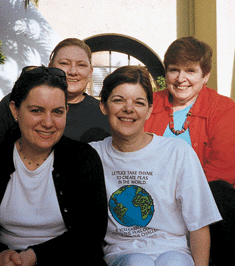 |
|
Four National Peace Corps Association board members are GW alumnae (from left): Dina Siber, BA ’91, Sharon Sugarek, MBA ’81, Susanne (Becker) Cooper, BA ’68, and Kelly (Burn) Brest van Kempen, BA ’65. Brest van Kempen also serves as NPCA general counsel.
|
Evanson is quick to admit that neither idealistic nor altruistic reasons motivated her to serve in the Peace Corps. “I definitely had my own agenda for going,” she says, citing personal growth and professional development as the chief motivating factors. “The Peace Corp offers 20-somethings an incredible amount of responsibility and freedom,” she says. “If you’re interested in development work, the Peace Corps is the most open door and easiest access into that world.”
For Evanson, the strategy paid off. At the time of our August interview, she had just landed a position as regional HIV coordinator for East Africa for the American Red Cross and was preparing to leave for at least a yearlong assignment in Uganda. “I’ll be based in Kampala and will be working on HIV prevention and mitigation, with a special focus on blood donor recruitment and retention,” she says. “I definitely attribute getting this job to my Crisis Corps experience.”
The direction of Meredith Bellows’ career was similarly shaped by her Peace Corps experience. Bellows, BA ’94, served two years with the Peace Corps in Guatemala, returning to Washington in October 2000. “I wanted an adventure, to shake things up in my life, to live another culture,” says Bellows, who had previously studied abroad in Chile and was eager to perfect her Spanish.
She was sent to the lakeside town of San Juan la Laguna, where she served as a small business consultant, working as a trainer for poor women receiving microcredit (small loans). “It really changes lives,” she says of the scheme. “You give someone a little boost and they just soar.” During her two-year assignment, Bellows worked with 10 groups of 20 women. “The biggest impact I made was showing women that they could be successful…teaching them to demand better for themselves,” says Bellows, who has a degree in economics.
Bellows adds that she made wonderful friendships with people in the town, enhancing her own life and the lives of others in sometimes-unexpected ways. “I made an oven for a woman out of tin foil and chicken wire, and taught her how to bake,” reflects Bellows. “She now bakes incredible gingersnap cookies and banana bread.”
Since returning to the United States, Bellows has visited San Juan la Laguna twice during business trips to the region as part of her new job with the Riecken Foundation in Washington, an operating foundation that builds libraries in Central America. “The job fits in perfectly with my Peace Corps work,” she says. Her hope is to eventually inaugurate a library in San Juan la Laguna, which, like all of Guatemala, has no culture of libraries. “It would mean that I’d come complete circle,” she says. “That would be the greatest day.”
In addition to being a top school for Peace Corps recruitment, GW also is well represented on the board of directors of the National Peace Corps Association, the non-profit organization of returned Peace Corps volunteers. The 35-member board currently contains four GW alumni: Kelly (Burn) Brest van Kempen, BA ’61, who will complete nine years of service this fall; Susanne Becker Cooper, BA ’68; Dina Siber, BA ’91; and Sharon Sugarek, MBA ’81.
The organization is a natural continuation of the Peace Corps experience, according to Sugarek, who served as a science teacher in The Gambia, West Africa, from 1971 to 1973. “The National Peace Corps Association helps bring us together to continue to serve in a variety of ways,” she says. “As the alumni association of returned Peace Corps volunteers, we try to keep the Peace Corps spirit alive by encouraging volunteerism at home and abroad. We’re involved in many types of community service, from education to assistance at food banks and homeless shelters.”
According to Sugarek, who now serves as vice president of marketing for Orbit Power in Dallas, the Peace Corps gives volunteers a perspective that stays with them all their lives. “So many of us get all bent out of shape over small, unimportant things,” she comments. “Once you’ve lived in a developing country where people are struggling with day-to-day life, it gives you an entirely new perspective. I’ve used it as a touchstone in my life.”
Dina Siber, who serves both as a board member of the National Peace Corps Association and as president of the Returned Peace Corps Volunteers of Greater New York, agrees that the Peace Corps was a pivotal experience in her life.
“I gained the ability to adapt to any environment, to stand up on my own feet, and walk forward,” says Siber, who was part of the first group of Peace Corps volunteers to serve in Albania from 1992 to 1994. “I’m not afraid to do anything now. I have the confidence to walk into any situation, because nothing can be harder than learning how to make do and shine with no resources.”
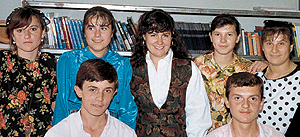 |
|
Flanked by some of her high school English students, Dina Siber, BA ’91, (center), was one of the first Peace Corps volunteers to serve in Albania. Her classroom doubled as the school’s English language library.
|
Siber relished the opportunity to serve in Albania. “It was great to serve in a new country on the Peace Corps map, a former Communist country that had not had Americans or foreigners living there for 50 years,” she says. “Once I arrived home and Albania began dominating so much of the news, I became somewhat of a local expert, receiving requests to serve on panels and do translation projects.”
Now a channel account manager for Sitelite, Inc., a management service provider, Siber calls GW “a natural breeding ground” for Peace Corps Volunteers. “Going to school in Washington, D.C., and having access to all the international organizations and professionals was what led me to want to enter the Peace Corps,” she says.
Not surprisingly, Washington, D.C., boasts the largest chapter of Returning Peace Corps Volunteers in the country. Dave O’Neill, who was elected president of the Washington chapter last year, says that he could not have taken over the reins at a busier time. “The Peace Corps’ 40th anniversary celebrations will take place in Washington this spring, and our local group is co-hosting the activities along with the national board,” he says. A special highlight of the weekend will be a multicultural education forum on GW’s campus, co-hosted by the University’s Graduate School of Education and Human Development’s International Education Program. The forum, addressing the issues in today’s multicultural classrooms, will feature focus groups and a panel presentation.
“The forum will be aimed at enhancing participants’ “cultural literacy” skills, which are so necessary in the context of a global community,” says Flavia S. Ramos, visiting assistant professor of international education. “We hope the program will focus the academic community’s attention on the issues faced by immigrant/international students and their families when they come in contact with the United States’ formal education system, community life, and diverse cultural norms.”
In that same spirit, GW, for the past decade, was one of 12 universities nationwide to offer a Peace Corps fellowship program for returning volunteers interested in becoming teachers. This summer, the program changed its name to GW Teaching Corps Partnership, expanding to incorporate AmeriCorps volunteers and Teach For America Corps members, in addition to the returned Peace Corps volunteers. Launched in 1991, the two-year, full-time master’s program offers degrees in transition special education and secondary education. Designed to prepare educators to fill areas of need in urban middle and high schools, the program enjoys a stellar reputation.
“So far, we’ve had 85 returned Peace Corps volunteers graduate from the program,” says program director Jeanne Embich, “and 10 more will be starting in January. These individuals demonstrate so many of the qualities that make great teachers, such as the ability to overcome challenges and the drive to achieve results. They’ve had culturally diverse experiences and many are bilingual. They are very committed, hardworking, and enthusiastic. What more could you ask for? They are a wonderful pool of candidates for the teaching profession.”
Returned Peace Corps volunteers also lend a helping hand throughout Washington and the rest of the country through their regional alumni associations. “Returning volunteers are often eager to continue their volunteer work in their communities after arriving home in the United States,” says O’Neill, pointing out that the Washington chapter has refurbished District parks, painted homeless shelters, tutored, and provided speakers.
A decade after completing his assignment in Africa, O’Neill says that he continues to reap the benefits of his Peace Corps service. “I was able to witness the substance of people in the absence of material things,” reflects O’Neill. “You can experience it here with your loved ones and best friends when you try, but in Africa it’s part of your day-to-day life. The people of Sierra Leone have no material possessions, but their smiles could not have been more beautiful. It’s an experience that will never leave me.”
Meredith Bellows, too, says that her Peace Corps tenure was a life-changing experience. “I loved living in another culture, and am so much happier now as a result of it,” she says. “My time in Guatemala really helped me figure out what makes me a happy, productive person and what components of my life are most important to me. That might just be called growing up, but the Peace Corps definitely speeds the process along.”

Letter from Guatemala
Meredith Bellows, BA ’94 wrote the following article about her Peace Corps assignment in Guatamala. A version of this piece first appeared in The Boston Globe. We print it here with the author’s permission.
I separated beans with my neighbors a few weeks ago.I stopped by to say hello and wish Dona María happy birthday, and I ended up staying for an hour, my hands dipping into a straw basket of tiny, smooth, black beans, over and over again. From each scooped-out handful, we flicked out the tiny pebbles, bits of twigs and leaves, picked out the occasional red bean, and poured the remaining black beans in with the other cleaned ones. In the end, however, it was pretty much chaos, with the father, the grandmother, and me randomly scooping, flicking, and picking.
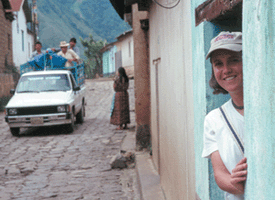 |
|
From the doorway of a friend’s house, Meredith Bellows, BA ’94, surveys the scene on one of San Juan la Laguna’s main thoroughfares during her two-year tenure in Guatemala.
|
Although I was not very impressed by their system, I wasn’t about to mess with it. They were only beans, after all, and I didn’t join the Peace Corps to be efficiency police. Among many things I have learned during my two years of service here is to know when to mind my own business.
San Juan la Laguna is a town of about 4,000 people, and is almost entirely indigenous. It is nestled on a small flat between gorgeous Lake Atitlán and steep, green, volcanic hills. Townsfolk come down these hills with black beans still in their long green and purple pods among a snarl of vines and leaves, and set the mass out to dry.
Once dry, it’s time to bring in the bean whacker, a small man who—with a pack of scraggly kids clustered around him—whacks the beans free and gathers up every last one. I watched him work meticulously in my landlord’s yard one afternoon. When he was done, my landlord’s wife came out with a pink cup of hot chocolate and a piece of bread. She paid him $2.
I am intrigued by such small businesses. As a “Small Business Development’” volunteer, my main job is to work with women’s groups that have formed community banks. The women in the groups receive loans of about $250 from the Guatemalan foundation with which I was placed. The groups gather monthly to make capital and interest payments, and at these meetings I give training talks on simple business topics such as costing products, the importance of saving, planning new work, and how to value one’s time.
I also help give regional seminars, and last week, I helped give my final of seven. Thirty women from my groups, mostly indigenous and from all around Lake Atitlán, gathered in San Lucas Toliman’s acoustically challenged theater for two days of nonformal education.
The seminar was positive and fun. The highlight was when my Guatemalan coworker, Cecilia, handed out giant red letters and the women made a big alphabet circle. Cecilia had them move around and spell words like “women” and “house” and “banks.”
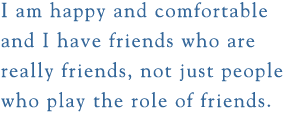 After the friendly spelling bee, my Guatemalan supervisor told them that 16 women had signed the attendance sheet that day with a thumbprint, and that the next day not a single print would be accepted. We spent the next hour writing out initials and helping the women who had never learned to write. Half the group practiced diligently, writing with their free seminar pens in their free seminar notebooks. After the friendly spelling bee, my Guatemalan supervisor told them that 16 women had signed the attendance sheet that day with a thumbprint, and that the next day not a single print would be accepted. We spent the next hour writing out initials and helping the women who had never learned to write. Half the group practiced diligently, writing with their free seminar pens in their free seminar notebooks.
The next day, women signed with everything from a loopy signature with dots and tiny circles to stiff initials. Now I hear that several of the groups want writing lessons.
On Saturday night, back home, I went to say hello to my neighbors and Dona María invited me in. Her wood stove was burning hard, and several pots were sizzling on top: corn kernels in a murky broth, an enormous blackened teapot, and a pan of potatoes. I sat on a stool by the door and watched her work, deftly rolling and patting little balls of cornmeal dough into tortillas.
I sat on my stool, as I have done a million times, saying little and enjoying the peace of the tiny, cement-block kitchen, and the calmness exuded by María. She gave me a plate with several hot tortillas, and I felt full, happy, and at home.
In some ways, the Peace Corps is a cruel joke. I have spent two years immersing myself in work, my neighborhood, and in my life here. I am happy and comfortable and I have friends who are really friends, not just people who play the role of friends. Soon I will be picked up by Don Vilo in the Peace Corps pickup truck and yanked away, and I expect it to be almost too much to bear.
My teary neighbors, my sad-faced pregnant dog, my empty cinderblock rooms. I will console myself by telling myself that at least I left a trace in San Juan la Laguna, and I will remind myself that I am grateful to have had the chance in the first place, to have had friends, and to have images that will swim around in my head and remind me of my life here.
—Meredith Bellows, BA ’94
|